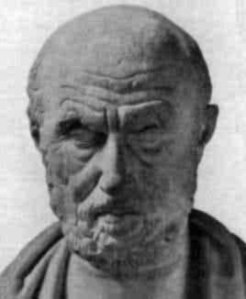Fifth/Fourth Century BCE – Greece
About 60 medical writings, known collectively as the Hippocratic corpus
Before the time of Hippocrates there had been little science in medicine. Disease was believed to be the punishment of the gods. Divine intervention came not from the natural, but from the supernatural.
‘Treatment’, therefore, came also from the supernatural, through magic, witchcraft, superstition or religious ritual. Hippocrates’ approach was remarkable given the age in which he lived. ‘There are in fact two things,’ said Hippocrates, ‘science and opinion’; the former begets knowledge, the latter ignorance.’
Although little is known about him, Hippocrates (Bukarat in the Muslim world) is now remembered as the Father of Medicine. He was a contemporary of Socrates and lived on the island of Cos. It is widely acknowledged that Hippocrates himself could not have written many of the texts attributed to him. Written over a century and varying widely in style and argument, it is thought they came from the medical school library of Cos, possibly put together in the first instance by the author to whom they later became attributed.
The corpus is the oldest surviving Western scientific text. It laid the foundations of the western medical tradition. Although its remedies are now considered ‘imaginative’, the corpus speaks the language of science; it does not speak of spells, daemons or gods.
Hippocrates cast aside superstition and focused on the natural, in particular observing, recording and analysing the symptoms and passages of disease. The prognosis of an illness was central to this approach to medicine, partly with a view to being able to avoid in the future the circumstances that were perceived to have initiated the problems in the first place. The development of far-fetched cures or drugs was not important. What came from nature should be cured by nature; therefore rest, healthy diet, exercise, hygiene and air were prescribed for the treatment and prevention of illness. [Vis medicatrix naturae – the healing power of nature]. The fact that Hippocrates was prescribing such a natural solution at all was a major advancement.
Hippocratic medicine was based on the balance of four elements – water (cold and moist), air (moist and hot), fire (hot and dry) and earth (cold and dry) – and four humors (bodily fluids) – phlegm, blood, yellow bile and black bile.
Whereas homeopathy attempts to treat disease by inducing in the patient symptoms similar to those displayed, according to the theory that symptoms are a manifestation of the body’s way of coping with the disease, allopathy describes a therapeutic technique that attempts a cure by inducing in the patient different symptoms. Basing treatment on symptoms, not causes, this enantiopathic technique can be fatal when applied to a system based on the humors. A person suffering from influenza is hot and thirsty (dry), so treatment with a mixture of cold and wet could result in a patient sitting a bath of cold water in a draughty room, awaiting a cure.
Personality or temperament was viewed as having four major types, sanguine, choleric, melancholic and phlegmatic.
Hippocrates regarded the body as a single entity, or whole, and the key lay in preserving the natural balance within this entity. Sickness was the sign of imbalance. When each of the factors was present in equal quantities, a healthy body would result. If one element became too dominant, then illness or disease would take over. If, for example, the sickness consisted of an excess of cold, moist humors, then the task of the physician was to restore the balance. The way to treat the problem would be by trying to undertake activities or eat foods which would stimulate the other humors, while at the same time trying to restrain the dominant one, in order to restore the balance and consequently, health.
The concept and treatment of humors endured for the next two thousand years, at least as far as the seventeenth century. The answers he prescribed for healthy living such as diet and exercise are still ‘good medicine’ and moreover, language introduced by Hippocrates still endures; an excess of black bile in Greek was ‘melancholic’, whilst someone with a too dominant phlegm humor became ‘phlegmatic’.
Physicians no longer practice Hippocratic medicine, but his name survives in the Hippocratic Oath that medical students take today.
The Oath, probably penned by one of his followers, is a short passage constituting a code of conduct to which henceforth all physicians were obliged to pledge themselves. It outlines, amongst other things, the ethical responsibilities of the doctor to his patients and a commitment to patient confidentiality – an attempt to set physicians in the Hippocratic tradition apart from the spiritual and superstitious healers of their day.


 NEXT
NEXT